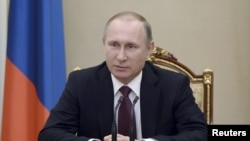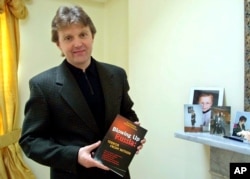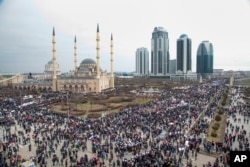A British public inquiry's finding that Russian President Vladimir Putin likely approved the assassination of a former Russian spy turned Kremlin critic in London has renewed attention on the number of Putin's opponents jailed or killed since he came to power.
Russian authorities quickly dismissed the inquiry’s assessment — that their security service in 2006 poisoned Alexander Litvinenko with radioactive polonium in a London hotel — as “politically motivated.”
Even before inquiry’s results were released, Putin’s press secretary declared the Kremlin was not interested in the case.
The inquiry’s conclusion that Russia had Litvinenko murdered for betrayal has raised some tension between London and Moscow.
While politicians and pundits debate whether Putin was involved in Litvinenko’s death, rights groups and independent analysts agree the pressure on Kremlin critics has been growing.
“What the Kremlin is responsible for, in my view, is not assassinations per se, is the atmosphere of lawlessness in which people settle scores with their rivals, their enemies, maybe their business competitors, by contracting assassins,” said Moscow-based political analyst and author on Putin, Maria Lipman. “This is the environment. And, certainly the Kremlin bears responsibility if people expect to get away with it and many do.”
Nemtsov's murder
Prominent opposition politician and Putin critic, Boris Nemtsov, was gunned down a year ago, on February 27, 2015, just meters from the Kremlin. Even though the area in which he was killed has high security and numerous CCTV cameras, no video evidence of the murder has emerged. A week later both suspects were arrested, both Chechen.
The leader of Russia’s Republic of Chechnya, and die-hard Putin supporter, Ramzan Kadyrov called one of the suspects, Zaur Dadayev, a "patriot of Russia."
No attempt was made to investigate Kadyrov, even after he voiced support for the main suspect. Putin later honored Kadyrov for his service to the nation.
Kadyrov this month said Russia’s opposition politicians should be treated as “enemies of the people and traitors who should be put on trial with maximum severity, for sabotage.”
Contrary to an official rebuke, Putin’s press secretary Dmitry Peskov this week seemed to support Kadyrov’s comments.
“If [you] read carefully, [you can see that] non-systemic opposition is described there," Peskov told Russia's Interfax news agency, "those whose activities are not within the law and those who are ready to violate the law and harm their country,” he said.
Politkovskaya's shooting
The same year Litvinenko was killed in London, Novaya Gazeta journalist Anna Politkovskaya was shot to death in her Moscow apartment building.
The independent newspaper is one of the few that is willing to print criticism of Russian authorities, including the Kremlin.
Five of their journalists and one lawyer have been murdered for their work, most of them victims of contract killers.
Although suspects have been jailed, in only one case has the person who allegedly ordered the murder been identified.
The deputy chief-editor and head of the department of investigations at the newspaper, Sergei Sokolov, last year told VOA that “by a strange coincidence” all the killings had occurred since Putin had come to power. Sokolov said the “attitude of intolerance to any independent critics of the regime, has grown exponentially” and that “no one could be sure of his security today.”
'Undesirable' organizations
Putin last year endorsed a law against “undesirable” organizations that rights groups say intensifies a crackdown against dissenting voices by targeting foreign and international groups in Russia.
A 2012 law supported by the Kremlin labels Russian organizations as “foreign agents” if they accept donations from outside Russia and engage in activity deemed political.
Rights activists say the atmosphere has encouraged authorities to behave “more Catholic than the Pope” in moving against critics of the Kremlin.
In December, a Russian court for the first time sentenced a blogger to three years in prison for repeatedly protesting without permission. A 2014 law allows Russian authorities to sentence anyone up to five years in prison after four unsanctioned demonstrations within a six-month period.
“In the last few years the Kremlin has been demonstrating zero tolerance toward any expression of disloyalty or public criticism in the form of street action,” said Lipman. “Even if it’s a one person picket. Even if it’s just a small group.”
Growing repression
The intolerance of public criticism has increased alongside Putin’s popularity for annexing Ukraine’s Crimean peninsula and support for pro-Russia rebels in Ukraine’s east.
“Now that the Kremlin reached the popularity of over 80%, it is highly concerned to keep it,” said Lipman.
“And, how do you keep this amazing degree of approval? You nip in the bud any sign of disloyalty. You use intimidation and sometimes jailing, and sometimes people get beaten, so nobody would be encouraged to speak publicly against the government and especially to take public action,” she said.
Lipman said for the time being, however, it is not accurate to talk about there being a broad repression in Russia. “We are talking about a policy of selected repression and across-the-board intimidation,” she concluded.
Mark Grinberg contributed to this report.












